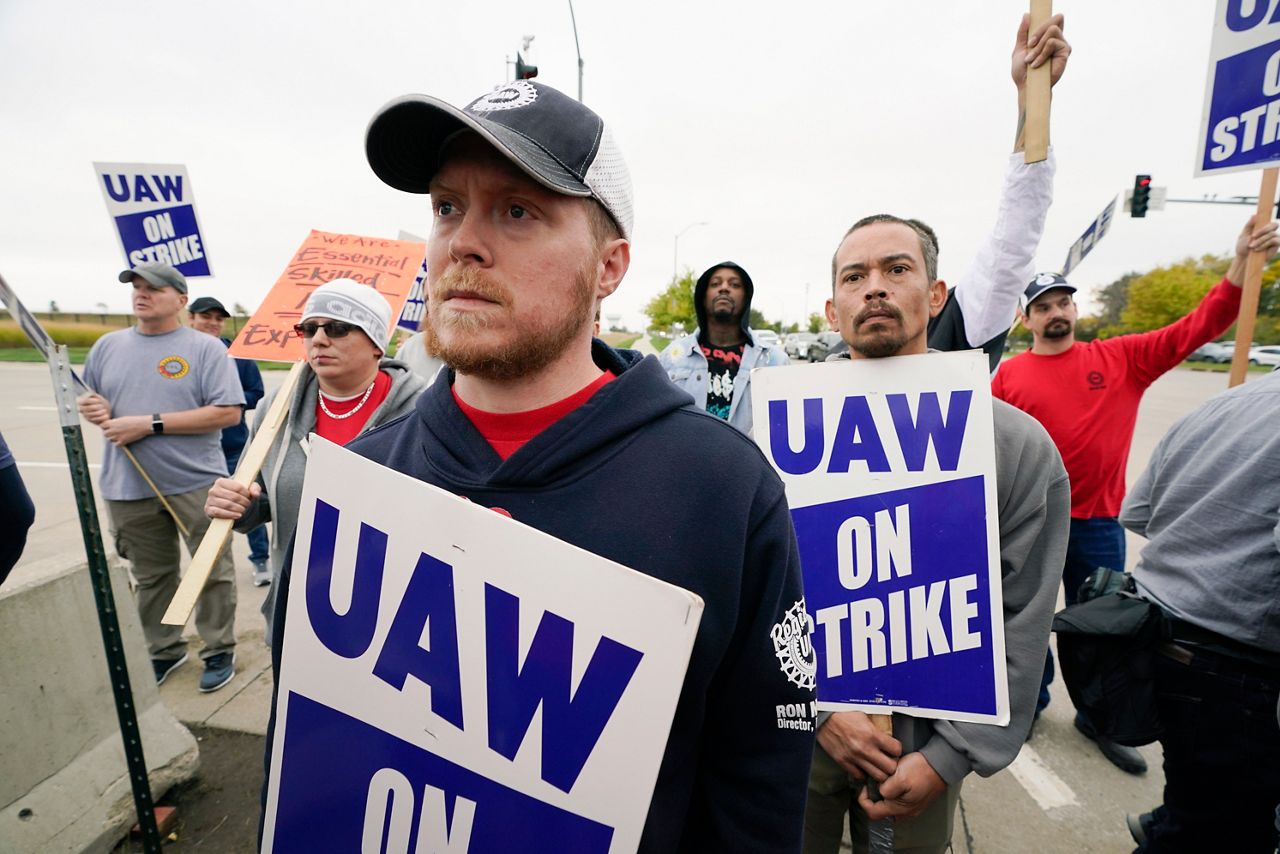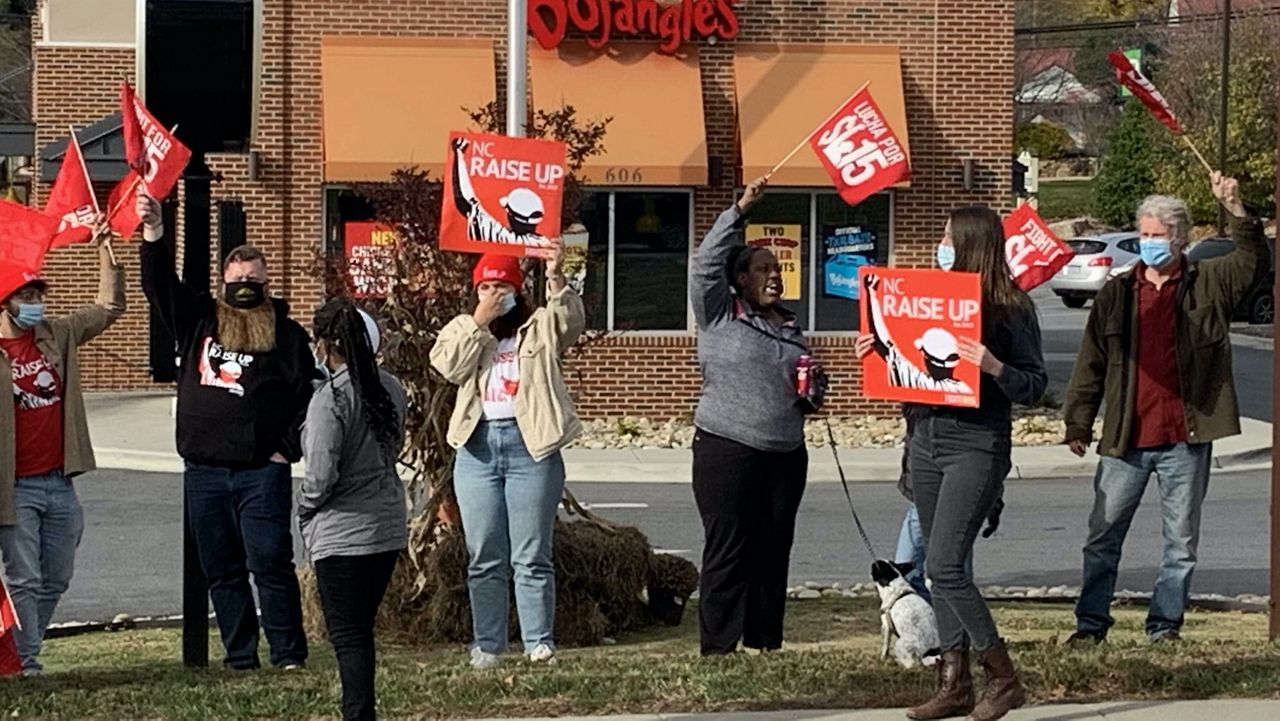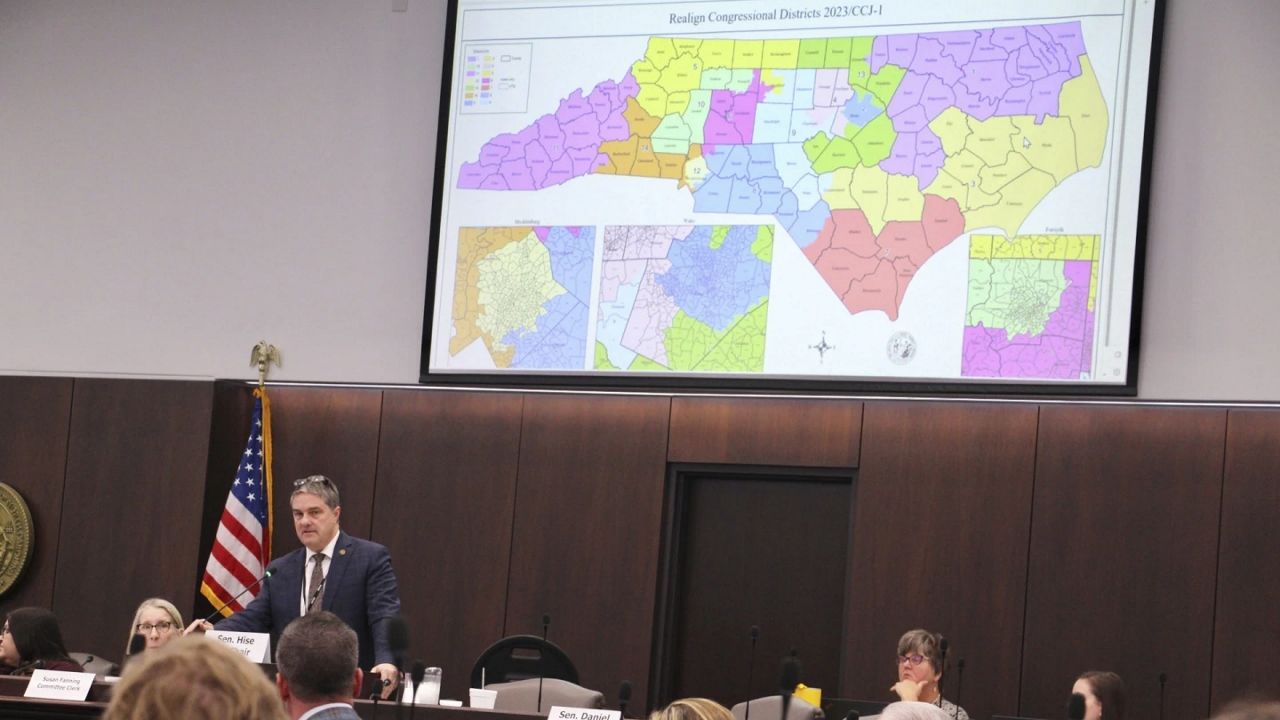BURNSVILLE, N.C. — Thirteen workers went on strike at the Bojangles. They had plenty of complaints. The pay is low. They say the general manager didn’t respect them. But when they heard about the COVID cases, that’s what really did it.
“One of my coworkers walked up to me and told me that two of my night-shift people that I had worked with popped up positive for COVID and she thought I should know because I was pregnant,” said Caitlin Jackson, who's worked at the store for two years.
Then there were more cases. Every time they brought it up to their boss, Jackson said, “She goes, ‘Oh it’s OK, you can choose to work or not.’ But if you chose not to work she would blow up your phone to see if you were coming to work or not.”
“It was just a big hassle about not finding out about people popping up positive for COVID while I’m pregnant, and I’ve got three kids that I take care of, two of them being my nieces,” she said.
The company disputes that.
“We strictly follow COVID-19 safety protocols, which includes notifying staff in close contact with confirmed cases, and remain committed to keeping both our staff and customers safe and healthy,” said Allyson Campbell with Bojangles of WNC.
The week-long strike started on Saturday, Nov. 6. Ultimately, 13 workers joined the walkout. They say that’s almost half the employees at the store. The Bojangles had to cut its hours, only staying open until 3 p.m.
The Bojangles sits on the main drag into Burnsville, a small mountain town near Mount Mitchell about a 40-minute drive from Asheville.
A sign taped to the drive-through Saturday read, “Due to being short staffed, our hours will be limited from 7am to 3:00pm today. Sorry for any inconvenience this may have caused. Sincerely, Mgt.”
“We had told her that the store needed to be closed down and cleaned professionally. We can clean it but it’s not going to do any good. I decided it was time to make a stand because she was not going to listen any other way,” said Jackson, who works at the store with her mother and sister. All three went on strike.
The strike ended after a week, with the striking employees delivering a set of demands to the company when they returned.
They gave the company that owns that Bojangles franchise four demands: close the store and have it deep-cleaned and sanitized, paid sick leave or time off for workers who are exposed to COVID-19, reimbursement for COVID testing costs, a $15 an hour wage and the right to unionize without interference from management.
They could go on strike again, they say, if their demands aren’t met.
The Bojangles strike in Burnsville didn’t happen in a vacuum. There have been at least seven other fast-food worker strikes in North Carolina this year, including simultaneous strikes in Durham, Charlotte and Marion, according to the group N.C. Raise Up and the Fight for $15, a union that’s been organizing low-wage workers.

The strikes that have gotten the most attention in North Carolina haven’t exactly been strikes. Public employees are not allowed to have collective bargaining in this state.
But when school bus drivers stage sick-outs in Wake County and Cumberland County, slowing down bus routes and leaving kids and their parents to figure out their own way to school, people take notice.
“You have these state employees and these workers that provide valuable services to our school districts, they take care of our kids, they have a huge amount of responsibility and demands on what they have to do,” said Rachel Wells, who works with the Teamsters union to help school employees in North Carolina.
“They can go somewhere at Target and be non-skilled and make more money than they can going to work for a school district. There’s something wrong with that picture,” she said. “People are taking action and taking action the only way they know how, which is taking it out on area school districts and refusing to work.”
The pay scales are “depressingly low,” she said. Bus drivers in some North Carolina counties start as low as $12.06 an hour. That rate is set by the state and bigger counties supplement that pay to attract and retain school staff like bus drivers, custodians and cafeteria workers.
“They can’t get kids to school without bus drivers. They can’t get kids fed without cafeteria workers. The buildings are not being cleaned because there are no custodians,” Wells said.
Wake County’s bus drivers won a raise from the school board, a 1% pay raise and a $1,250 bonus for all school staff after the board voted earlier this month. The bonus and the raises still need final approval from the board.
This week, Wake County warned parents at 32 schools to pack lunches for kids as cafeteria workers staged their own sick-out.
There could be some relief coming with the new state budget, which is in the final stages of approval in the General Assembly. The budget raises the minimum wage for most state employees to $15 an hour and includes other funds to help pay workers on the bottom of the state employee pay scale.
A full-time employee at $15 an hour ends up making about $31,200 a year.
Sarah Banks is 17 and a high school junior in Burnsville. When the striking Bojangles workers met at a park for a cookout on the last day of their strike, she and her grandmother were the first ones there.
She said she’s had three managers at the store since she started working there in July.
“This last manager, she didn’t tell us that we had four positive cases in the store. And we have some workers that have very concerning health issues and COVID can really hurt them, and she even let us work with some of those workers. And so we went on strike,” she said.
She was working that Saturday when they walked out. She was already mad, she said, because they had new people there and her manager wouldn’t help her. That’s when some of the older workers in the store said they were getting ready to go on strike.
“I was like, 'Well, I’m going to do it for y’all because I don’t think that a workplace should make me as mad as it did,” she said.
She said she’s trying to save up for college. She was promised a raise to $11.50, she said, but they only ended up giving her $11 an hour.
“Some of us workers don’t even get $10 and we can’t really survive on $10, especially if you have family and everything,” Banks said. “But honestly what I’m looking for is COVID safety and having more people working with us.”
She said people who get exposed to the virus or test positive need to stay in quarantine and get paid for that time when they can’t come to work.
The coronavirus has changed the dynamic for workers and employers. Since the pandemic, there’s a national labor shortage and demand is high for workers in low-wage jobs.
It’s a competitive labor market. There’s a lot of job openings. Workers don’t necessarily need to just settle for their first job offer. “It’s a competitive labor market. There’s a lot of job openings. Workers don’t necessarily need to just settle for their first job offer. They have opportunities to leave employment when they feel like they’re not being adequately compensated,” said MaryBe McMillan, president of the North Carolina State AFL-CIO.
Companies like Costco and Target have been raising their minimum wages for workers to $15 or more to be able to attract employees and keep them on staff.
Last month, Bank of America raised its minimum wage to $21 an hour and promised to increase that to $25 by 2025.
“I think that Costco and other companies now understand that if they want to recruit and retain workers, you have to pay them a living wage,” McMillan said.
“The fight for $15 is largely because of the efforts of those workers, fast-food workers, home health care aids, who have gotten in the streets, who have gone on strike, who have helped pushed a lot of these companies and state and local municipalities to raise wages,” she said.
“When the country shut down during this pandemic, working folks continued to work: the delivery drivers, the nurses, the grocery clerks, risking their own health and safety to make sure that we could have the goods and services we needed during the pandemic,” McMillan said.
“They’re fed up now with being called ‘essential’ but being treated as expendable. They’re fed up with low wages, with no paid sick leave, with erratic scheduling.”
That tight labor market, combined with stagnant wages, rising prices and stresses and frustrations from working through the pandemic has led to strikes across the country, said Eric Gellman, a history professor at the University of North Carolina at Chapel Hill who focuses on labor history.
“This didn’t just happen. It’s been building for years” he said. “They’re stuck in these very low-wage, precarious jobs where, even if you work full time in the food service industry, you might still have to use food stamps to get by,” he said.
And the stresses can be even higher for people like bus drivers.

“You have these state employees and these workers that provide valuable services to our school districts, they take care of our kids, they have a huge amount of responsibility and demands on what they have to do,” Gellman said. “They can go somewhere at Target and be non-skilled and make more money than they can going to work for a school district. There’s something wrong with that picture.”
There’s been more than 300 strikes around the United States this year, according to Gellman. Many of those have been small-scale strikes, such as workers at one fast food restaurant, but there have been some high-profile labor actions too.
The International Alliance of Theatrical Stage Employees, which represents workers on big Hollywood movie sets, threatened a strike over pay and working conditions, attracting international media attention.
IATSE members narrowly voted to approve a new three-year contract Nov. 15.
“Our goal was to achieve fair contracts that work for IATSE members in television and film—that address quality-of-life issues and conditions on the job like rest and meal breaks,” IATSE International President Matthew Loeb said in a statement. “We met our objectives for this round of bargaining and built a strong foundation for future agreements.”
John Deere workers have been on strike demanding higher pay for more than a month, stopping work at 12 plants in three states. Workers at cereal maker Kellogg have been on strike since early October.
In Burnsville, the striking employees went back to work this week. They’ve delivered their demands to management at the franchise, but it’s unclear what will happen next.
Allyson Campbell, the spokeswoman for Bojangles of WNC, said none of the workers have been disciplined or fired for going on strike.
The workers say COVID safety drove them to walk out, but Campbell insists the company is following federal guidelines to keep people safe from the coronavirus.
“The safety of our team members and guests remains our top priority as we navigate this extraordinary health crisis. Our focus continues to be on keeping our staff safe, our restaurants clean and our customers happy. We appreciate our staff’s hard work during a challenging year, and we also appreciate our customers’ patience as we work around staffing challenges related to the pandemic,” she said, responding to questions from Spectrum News by email.
“We adhere to the guidelines set by local officials and the CDC. Even prior to the pandemic, Bojangles restaurants have always emphasized cleanliness standards and safe food handling, including proper handwashing techniques. Every Bojangles location – including Burnsville – is constantly monitoring the protocols determined by local health officials to ensure compliance,” she said.
Workers were still worried about what could happen when they’re back on the job this week.
“For 13 of us to walk out of a store and them to have to reduce their hours to certain set hours because they now cannot fully run the store, I think that’s had to have had some impact,” said Misty Cambell, who works at the Bojangles with her daughter Caitlin Jackson and another daughter.
“We’re all worried about retribution and being treated different because of this,” she said.
“This is the first time I’ve ever done anything like this,” Campbell said Saturday, the day before they were set to go back to work. “For me, that was the right thing to do to protect my family and protect their health interests.”
“It is OK to stand up, it is OK to fight for your rights. You’re not just a number, you are a person, you are an individual, you have rights. You have the right to stand up and say ‘this is not OK,’” she said.








